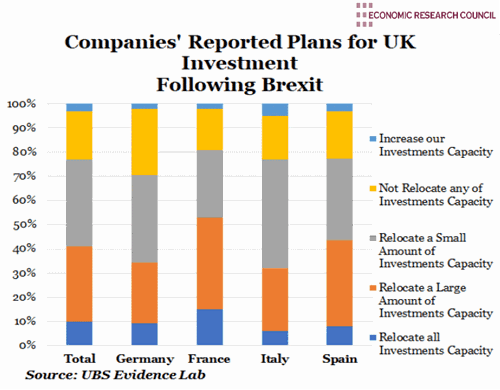“Trade protection accumulates upon a single point the good which it effects, while the evil inflicted is infused throughout the mass. The one strikes the eye at a first glance, while the other becomes perceptible only to close investigation.”
Frédéric Bastiat
A few months after that momentous Brexit referendum in 2016, I attended a Capital Economics seminar at which Roger Bootle floated the idea of a Unilateral Declaration of Free Trade. He explained that the World Trade Organisation tariffs were not so punitive as to present an insuperable challenge for the British economy, and that such a stance would challenge other countries to deal fairly with us in the future.
Now, with the EU negotiations performing their usual antics of drawing things out to the last minute and beyond, perhaps it is time to re-visit Roger’s suggestion in the context of the ‘No Deal’ scenario: such a stance would certainly ‘strike the eye at a first glance’.
In the immediate aftermath of the referendum, Roger’s Free Trade idea might have sounded too challenging for many businesses, and no doubt that’s why they have pushed so hard for the Customs Union. Now we’re so much closer to the closing bell, we should think seriously about the pros and cons of his idea.
Firstly, it couldn’t apply to all sectors: clearly agriculture and fisheries would have to be excluded, particularly with the EU still operating under the hugely interventionist Common Agricultural Policy. Government would need to liaise closely with business to ascertain where to draw the line, bearing in mind both short- and long-term consequences, and taking into consideration the disturbance to frictionless trade currently coming from the United States.
Secondly, where appropriate it would need to be time-limited. The offer of ‘Unilateral Free Trade’ tariff-free imports would need to be made in the expectation that countries, including EU countries, would reciprocate within a reasonable timeframe: say, 2 to 3 years. If our generosity was not matched over that timetable, we would reserve the right to apply import tariffs.
Thirdly, sectors which found themselves under pressure due to tariff-free competition from overseas would need to be able to call on state support. Remember, this is a ‘No Deal’ scenario for Brexit - so that support could be drawn from the £39 billion reserve which we would not be paying as an exit fee from the European Union (‘nothing’s agreed until everything’s agreed’).
The Economic Research Council published a survey last week of the intentions of EU-owned, but UK-located, businesses following Brexit. The contrast between French-owned and German-owned businesses was particularly interesting: no prizes for guessing the most pragmatic!

Image courtesy of Economic Research Council
What would be their intentions in the event of our ‘Unilateral Declaration of Free Trade’? The EU-sourced components flowing into their production centres within the UK would continue to be blessed with no tariffs, so their challenge would be the potential tariffs imposed by the EU on exports of finished products sold back to EU nations. One can imagine that they would place a significant amount of pressure on EU political leaders to reciprocate with free trade: the alternative of re-locating production would be very unappealing.
Ambrose Evans-Pritchard picked up the theme of ‘Unilateral Declaration of Free Trade’ in a considered editorial item in last Thursday’s Telegraph business section (‘Tearing down our tariff wall would put us back on the Brexit front foot’). He makes the point that several major sticking points in the current negotiations would fall away, including:
- the Northern Irish border, which would no longer be a problem on our side as imports would not require monitoring. A hard border would therefore only be a challenge for the EU/Republic of Ireland side, which could be avoided by dropping their tariffs on our exports to them;
- congestion at ports would again only be on the EU side, as goods will be able to flow freely through the ports on our side of the channel.
So, as time runs out for a negotiated deal, it may be time to throw down the gauntlet of generosity: albeit financing its cost with the aborted £39 billion. We are a free trade nation - let’s show it.
Gavin Oldham
Share Radio

